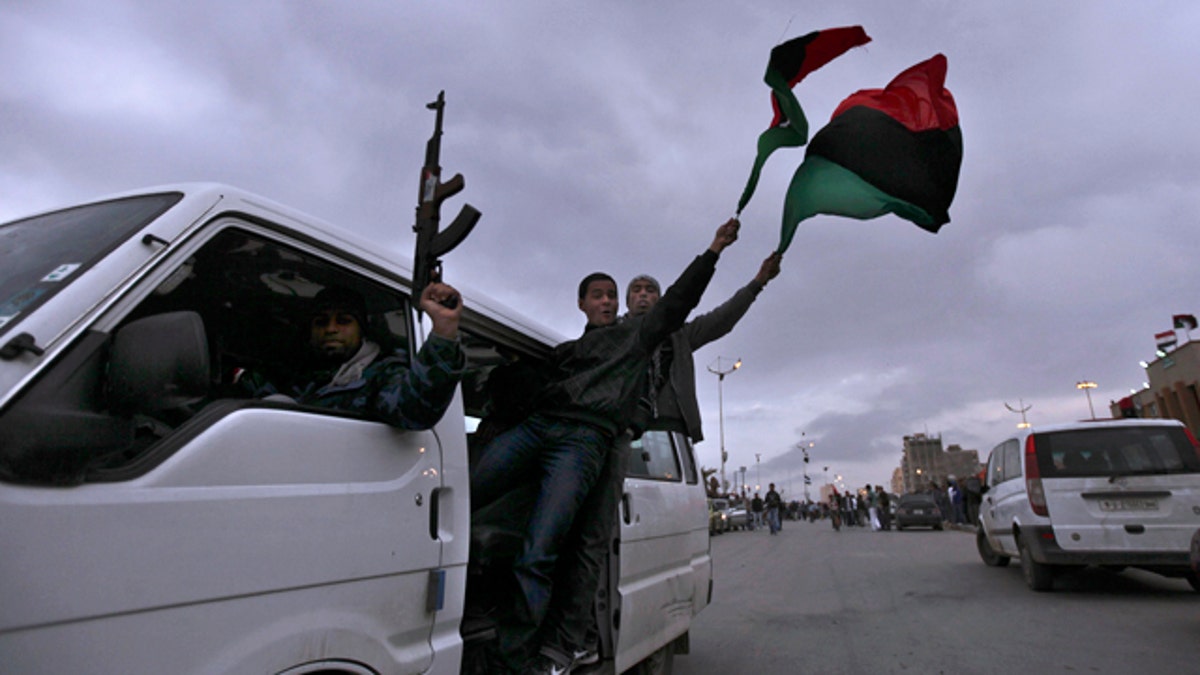
March 30: A Libyan rebel fires in air as others wave Libyan pre-Qaddafi flags as they ride a vehicle at twilight in Benghazi, Libya. (AP)
Fresh battlefield setbacks by rebels seeking to oust Libyan leader Muammar Qaddafi are hardening a U.S. view that the poorly equipped opposition is probably incapable of prevailing without decisive Western intervention -- either an all-out U.S.-led military assault on regime forces or a decision to arm the rebels.
Qaddafi is reaching deeper into his military ranks to send reinforcements onto the battlefield, has adopted new, unconventional tactics to counter the effects of coalition airstrikes, and apparently is convinced he can retain power by gradually retaking a degree of control of eastern Libya, a senior U.S. intelligence official said Wednesday. The official spoke on condition of anonymity to discuss sensitive intelligence on the condition and capabilities of regime and rebel forces.
U.S. officials believe Qaddafi's military has suffered major losses since Western intervention began March 19, in addition to grounding his air force. But Qaddafi's land forces still outmatch the opposition by a wide margin and are not close to being forced to stop threatening the civilian resistance, the senior U.S. intelligence official said.
That leaves the Obama administration with difficult calculations about the way ahead.
On Wednesday, rebels under heavy shelling pulled back further eastward from the oil port of Ras Lanouf. Qaddafi's forces were shelling Brega, another important oil city to the east and appeared poised to attempt to retake the town of Ajdabiya, just south of Benghazi.
Helping propel the Qaddafi forces eastward was a change in battlefield tactics, the senior U.S. intelligence official said. Having seen much of their armor pounded by Western airstrikes earlier, Qaddafi commanders left many tanks and other armor in hiding places in Sirte and advanced eastward instead with small convoys of sedans, minivans, SUVs and other civilian vehicles that the official called "battle wagons" armed with small rockets and other weaponry.
This made it harder for Western pilots to distinguish the Qaddafi troops as military formations and lightened the logistics load for the Qaddafi forces.
Qaddafi in recent days also has mobilized second-tier ground forces that U.S. officials believe are less capable and less trusted by Qaddafi, the official said. This appears to reflect the Libyan leader's determination to press his advantage while the Western powers are self-limited in their assistance to the rebels.
In public, the Obama administration has stuck to its view that progress is being made in preventing Qaddafi from attacking or threatening to attack civilians. But many in Congress question whether the administration has a plan to adjust its approach in the event that the opposition forces collapse entirely. That is likely to be among the topics at a closed congressional hearing Wednesday featuring Defense Secretary Robert Gates, Secretary of State Hillary Rodham Clinton and Joint Chiefs of Staff Chairman Adm. Mike Mullen. Gates and Mullen are scheduled to appear at open Senate and House hearings on Libya on Thursday.
Although they have not discussed it publicly, U.S. officials are showing through the military's choice of bomb targets that they do worry about a potential scenario in which Qaddafi -- feeling he is about to go down -- might launch heavy missiles, possibly armed with chemical weapons, at Benghazi or other areas beyond his control. That is why the U.S. this week launched a barrage of 22 Tomahawk cruise missiles at sites around Tripoli that house surface-to-surface missiles like Scuds, the intelligence official said.
President Barack Obama has explicitly ruled out using American ground forces, but his administration and European governments participating in the U.N.-sanctioned mission in Libya have said they are considering providing arms to the rebels. Such a move would require Obama to step back from his pledge to avoid an open-ended commitment in Libya.
Similarly, a decision to fully coordinate Western air power with rebel ground movements would place Washington openly on the side of the rebels, whose goals and makeup are murky and whose chances of winning -- even with more air support -- are questionable.
The alternatives include sticking to the current approach, which was cast by Obama in a speech to the nation Monday as focused on protecting Libyan civilians from attacks by regime forces. That effort succeeded last week in stopping pro-Qaddafi forces from entering the de facto rebel capital of Benghazi in eastern Libya, but when the rebels this week advanced westward to the doorstep of Qaddafi's home town of Sirte, they were repelled and forced to retreat.
State Department spokesman Mark Toner said the U.S. government was still gaining a better understanding of the opposition, and that no decision had yet been made on providing arms or any other assistance to rebels fighting Qaddafi's troops.
"Our assessment will help define our actions as we go forward," he said Wednesday.
Pressed as to whether any administration official was pushing for arms transfers to the rebel forces, Toner replied: "Not that I'm aware of."
The Obama administration has publicly resisted the notion that Qaddafi is likely to prevail in this conflict, stating as U.S. policy that he has lost legitimacy and must go.
The top U.S. intelligence official, James Clapper, contradicted the White House line when he told senators on March 10 that the Libyan government's military might was stronger than some had believed. Clapper said there was no indication that Qaddafi would step down and offer a speedy resolution to the crisis that began in February as civil unrest that toppled authoritarian leaders in neighboring Tunisia and Egypt spread across the Arab world.
"This is kind of a stalemate back and forth, but I think over the longer term that the (Qaddafi) regime will prevail," Clapper said.
